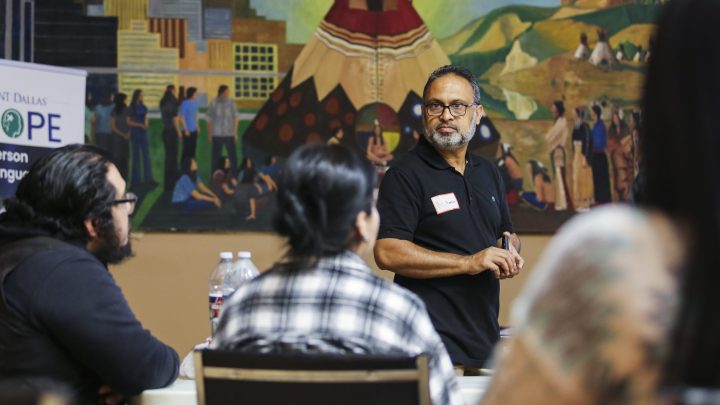
Less than 1% of therapists are Native American. One Texas center is working to fill the gap
Less than 1% of therapists are Native American. One Texas center is working to fill the gap

In Dallas, a clinic called Texas Native Health has been supporting the state’s Indigenous population for more than 50 years. It serves any enrolled tribal member for healthcare appointments. But over the years, the clinicians there noticed a greater need for mental health services.
“We’re only human beings, we can only handle so many things at any given point,” said Chris Logan, who is a citizen of the Choctaw tribe and part of the clinic’s behavioral health team. “We may need someone to talk to.”
The clinic has been expanding mental health services this year, including individual counseling appointments, trauma therapy, and group sessions. The clinic calls those meetings “The Healing Circle.”
“One of the big things about group therapy is that it helps bring that sense of, I’m not alone anymore,” Logan said. “I don’t have to carry this burden by myself.”
Texas Native Health is one of more than 70 urban health clinics across the country that specifically serve Indigenous communities. But it’s the only one of its kind in Texas. Nationally, about 70% of Native Americans live in urban settings. Dora Brought Plenty, who is a citizen of the Standing Rock Sioux tribe, says the clinic has been her safe place since 1971.
“It’s where I found my place to heal myself mentally,” Brought Plenty said. “And I still come to this day.”
Brought Plenty originally started therapy to process the abuse she experienced at a Native American boarding school as a kid. The U.S. Department of the Interior established the Indian Boarding School Initiative in 2021 to investigate the physical and emotional abuse at these schools, and their wide-ranging health impacts on people today.
Initially, therapists and psychiatrists just didn’t have a clue how to treat Brought Plenty. When she came to the clinic, she finally felt understood.
“They know our history,” she said. “They’re familiar with it, if not have lived it or lived through it, because there’s generational trauma that all of us are healing from. So, it is very important. This center has saved me so many times.”
Native Americans have higher rates of suicide, substance use disorder and PTSD than other groups. According to a paper by Harvard professor Joseph Gone, that’s because of the legacy of colonization in the U.S. But some therapists might not be trained to look at the root causes.
“Generational trauma, the experience of poverty, unemployment, discrimination — if someone doesn’t know these things, it is unlikely that the care will be provided with respect,” said Syeda Jesmin, associate professor at the University of North Texas at Dallas.
She leads mental health awareness trainings with different groups, including Texas Native Health.
The latest data from the American Psychological Association shows more than 80% of the psychology workforce is white. Only 0.13% identify as American Indian or Alaska Native. That’s not even half a percent.
Chris Logan, the counselor with Texas Native Health, said most culturally specific care tends to be offered on tribal lands. So, folks travel from all over the state to meet with Native counselors like him in the city.
“So many Native Americans either live away from reservations or don’t have resources to go back to reservations to see a therapist,” Logan said. “We are here to help provide services for people that can’t make that journey.”
He said his favorite part of his work is helping clients process things that have been holding them back for years, even decades.
“That’s probably the greatest reward – just seeing them take that step and having the confidence in themselves that hey, yeah, this is my past, but I want my present and future to be different,” Logan said.
Dora Brought Plenty was in her twenties when she first came to this clinic. Now, in her seventies, she openly talks about her experience, so younger folks in the Indigenous community know they can reach out for support.
“There’s something about us that we within ourselves are strong,” she said. “But we’ve got to be able to find the help.”
Brought Plenty said there’s still more healing to do, but she’s glad Texas Native Health will be there for the community along the way.
For resources and support, call 988 to reach the Suicide and Crisis Lifeline, or text NATIVE to 741741 to reach a crisis counselor on the Crisis Text Line.
There’s a lot happening in the world. Through it all, Marketplace is here for you.
You rely on Marketplace to break down the world’s events and tell you how it affects you in a fact-based, approachable way. We rely on your financial support to keep making that possible.
Your donation today powers the independent journalism that you rely on. For just $5/month, you can help sustain Marketplace so we can keep reporting on the things that matter to you.

















